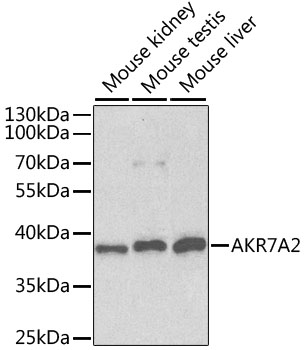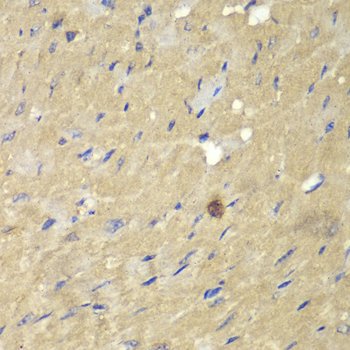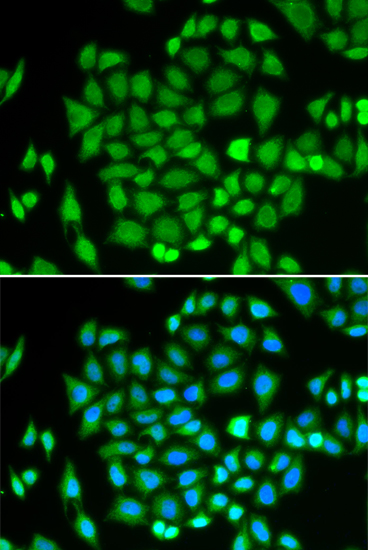-
Product Name
AKR7A2 Polyclonal Antibody
- Documents
-
Description
Polyclonal antibody to AKR7A2
-
Tested applications
WB, IHC, IF
-
Species reactivity
Human, Mouse
-
Alternative names
AKR7A2 antibody; AFAR antibody; AFAR1 antibody; AFB1-AR1 antibody; AKR7 antibody; aldo-keto reductase family 7 member A2 antibody
-
Isotype
Rabbit IgG
-
Preparation
Antigen: Recombinant fusion protein containing a sequence corresponding to amino acids 100-359 of human AKR7A2 (NP_003680.2).
-
Clonality
Polyclonal
-
Formulation
PBS with 0.02% sodium azide, 50% glycerol, pH7.3.
-
Storage instructions
Store at -20℃. Avoid freeze / thaw cycles.
-
Applications
WB 1:500 - 1:2000
IHC 1:50 - 1:200
IF 1:10 - 1:100 -
Validations

Western blot - AKR7A2 Polyclonal Antibody
Western blot analysis of extracts of various cell lines, using AKR7A2 antibody at 1:1000 dilution.Secondary antibody: HRP Goat Anti-Rabbit IgG (H+L) at 1:10000 dilution.Lysates/proteins: 25ug per lane.Blocking buffer: 3% nonfat dry milk in TBST.Detection: ECL Basic Kit .

Immunohistochemistry - AKR7A2 Polyclonal Antibody
Immunohistochemistry of paraffin-embedded mouse heart using AKR7A2 antibody at dilution of 1:100 (40x lens).

Immunofluorescence - AKR7A2 Polyclonal Antibody
Immunofluorescence analysis of HeLa cells using AKR7A2 antibody . Blue: DAPI for nuclear staining.
-
Background
Catalyzes the NADPH-dependent reduction of succinic semialdehyde to gamma-hydroxybutyrate. May have an important role in producing the neuromodulator gamma-hydroxybutyrate (GHB). Has broad substrate specificity. Has NADPH-dependent aldehyde reductase activity towards 2-carboxybenzaldehyde, 2-nitrobenzaldehyde and pyridine-2-aldehyde (in vitro). Can reduce 1,2-naphthoquinone and 9,10-phenanthrenequinone (in vitro). Can reduce the dialdehyde protein-binding form of aflatoxin B1 (AFB1) to the non-binding AFB1 dialcohol. May be involved in protection of liver against the toxic and carcinogenic effects of AFB1, a potent hepatocarcinogen.
Related Products / Services
Please note: All products are "FOR RESEARCH USE ONLY AND ARE NOT INTENDED FOR DIAGNOSTIC OR THERAPEUTIC USE"
